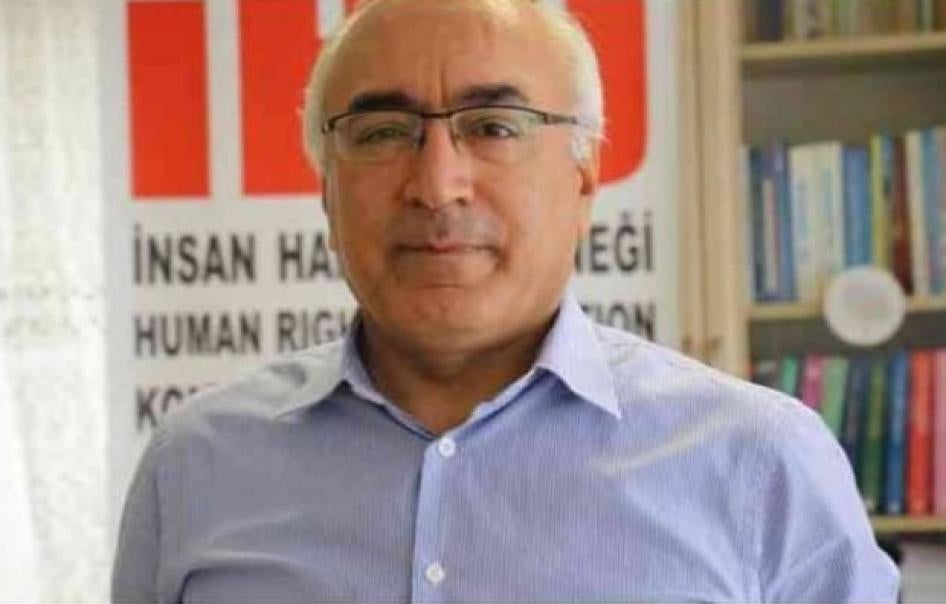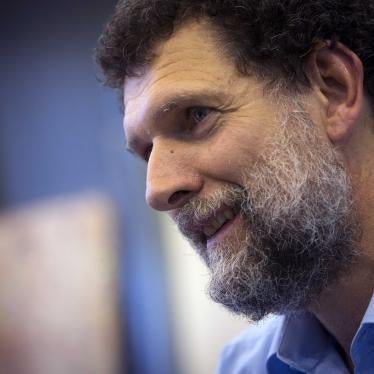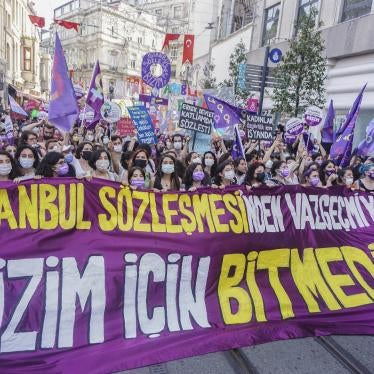(Istanbul) – The prosecution of a human rights defender demonstrates the Erdoğan government’s policy of bringing baseless criminal charges against people involved in legitimate and peaceful civil society activities, Human Rights Watch said today.
Öztürk Türkdoğan, co-chair of the Human Rights Association, Turkey’s oldest human rights group, is scheduled to stand trial in Ankara on February 22, 2022, on charges of “membership in a terrorist organization.” If convicted, he could face a sentence of 5 to 10 years in prison. Türkdoğan is also being prosecuted in two other trials on charges of “insulting” the interior minister and “insulting the Turkish nation, Republic of Turkey, state institutions and bodies,” each with a possible penalty of up to two years in prison. All indictments against him were prepared in December 2021.
“The prosecution of Öztürk Türkdoğan, the long-term co-chair of the Human Rights Association, is an attempt to criminalize legitimate human rights work and the right to free speech,” said Hugh Williamson, Europe and Central Asia director at Human Rights Watch. “The fact that Ankara prosecutors prepared three indictments against Türkdoğan in a single month for speeches and statements that do not advocate violence and were made over several years, points to a political order from above behind these criminal proceedings.”
On March 19, 2021, police briefly detained Türkdoğan from his home, searching his house and confiscating his laptop and phone. He was later released with a travel ban imposed on him.
The evidence in the indictment charging Türkdoğan with “membership in a terrorist organization,” the most serious charge he faces, consists of Türkdoğan’s speeches, statements, and conversations in his capacity as the co-chair of the Human Rights Association. The indictment cites nine broadcasts in which the ANF Kurdish media outlet included clips of Türkdoğan making public statements on various dates between March 2015 to January 2020.
The statements include calls to end the prolonged solitary confinement of Abdullah Öcalan, the jailed leader of the Kurdistan Workers’ Party (PKK), and other prisoners, and relate to hunger strikes by prisoners supporting the lifting of solitary confinement. Other evidence cited in the indictment includes seven phone calls on various dates in 2019, four with media outlets or journalists.
The indictment also cites three photographs found on Türkdoğan’s laptop showing banners prepared by the Human Rights Association. Two protest solitary confinement in prisons and the treatment of sick prisoners and a third calls for the recognition of Saddam Hussein’s Anfal campaign in Iraqi Kurdistan in the 1980s as a genocide against Kurds. The indictment also asserts that Türkdoğan transferred money “to persons subject to legal processes in connection with terrorist organization membership,” an allegation he denies.
The two other indictments were prepared by different Ankara prosecutors. One concerns a statement made on April 24, 2017, by the Human Rights Association on its website calling for an end to Turkey’s denial of the Armenian genocide. The prosecutor alleges the statement exceeds the limits of freedom of expression and amounts to the offense of “insulting the Turkish nation, the state of the Republic of Turkey, state institutions and bodies” under Article 301 of the Turkish Penal Code.
The third indictment accuses Türkdoğan of “insulting” Interior Minister Süleyman Soylu, under article 125 of the Turkish Penal Code on the basis of a February 18, 2021 statement on the Human Rights Association website responding to the minister’s harsh criticism of the association in a parliamentary speech.
“The Turkish authorities should ensure that all charges against Öztürk Türkdoğan are dropped immediately,” Williamson said. “The government should stop harassing human rights defenders and ensure that they can carry out their legitimate activities without fear of reprisals, arrest, and abusive criminal proceedings.”









